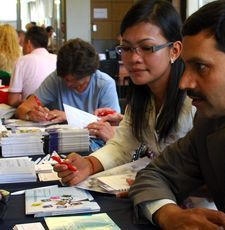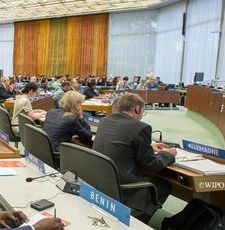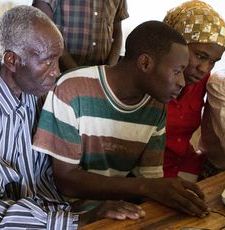Developing a Library Copyright Policy: An EIFL guide
This guide is intended to highlight issues when considering the creation of a copyright policy for your library, how to go about drafting a policy and the elements that a library copyright policy might contain. We welcome more examples of library copyright policies. Libraries or librarians from EIFL partner consortia are free to contact the EIFL-IP Programme for advice or support on developing their own policy.
Browse the guide online or click here to download.
I. What is a library copyright policy?
II. Why do libraries have one?
lll. Do I need a copyright policy?
IV. Creating one
V. What do other library copyright policies look like?
VI. FAQs
VII. How to go about drafting a library copyright policy
VIII. Education and promotion
I. What is a library copyright policy?
A library copyright policy is a tool to provide clarity on copyright issues that arise during the provision of library services, and to help manage risk for the library and its parent institution. It should aim to achieve three basic objectives:
- Compliance – consistency in managing the copying of copyrighted materials by library staff and users in order to avoid infringing activities, and compliance with the copyright law in your country and the licences applicable to electronic resources in your library.
- Guidance – clear guidelines to staff and users of the library on aspects of library services and the use of library resources that relate to copyright.
- Education – educating library staff and end users such as academics and students about copyright and what they may and may not do.
The policy should be reviewed and updated regularly to reflect the information environment in which the library is operating, in particular changes in national legislation or to the licences that govern the use of electronic resources in the library, changes to the uses made of library materials by staff and end users or the introduction of new services.
II. Why do libraries have one?
A library may decide to create a copyright policy on its own initiative to provide information to staff and users on an integral aspect of library work. A library may also be asked by the parent institution to develop a policy as part of a wider institutional policy on intellectual property. In either case, a library copyright policy aims to answer common questions asked by library staff and users in relation to copyright and the provision of library services. It often has an FAQ section to help answer common enquiries. A library copyright policy is also a tool to reduce liabilities for the library and its parent institution by providing clear instruction on what is and what is not allowed.
III. Do I need a copyright policy?
Firstly, consider whether a copyright policy is beneficial to your library. Drafting a copyright policy takes time and energy and, in some cases it might be better not to have a policy than to have one that is too rigid for everyday use.
Initial questions to consider:
- What library services do we provide, and which ones involve copyrighted content?
- How do the services fit within my national copyright law and/or the licences held by the library?
- Examples of library activities that hold a risk of liability:
- Self-service copying by users (photocopying, printing, downloading)
- Copying for users by library staff
- Inter-library document supply to end-users
- Making of course packs
- Digitisation of library materials
- Certain uses of orphan works e.g. digitisation
- What risks are not acceptable to take?
- What risks are acceptable to take?
When considering the amount of risk, you must consider the likelihood of your institution being sued by rightsholders or organisations that represent rightsholders in your country, such as a publishers' association or a reproduction rights organisation (RRO). It is important to note that the risk will normally be carried by the institution as the library is not usually a separate legal entity. Therefore it is essential to discuss the issue of risk and responsibilities with the authorities in your institution. Librarians are not usually sued in a personal capacity by rightsholders for the activities they undertake or condone. However, there may be other consequences, such as impact on career prospects if a risk is undertaken by the librarian on behalf of the institution without their prior knowledge or authorisation.
- Will the policy be followed? If not, how will we deal with it?
- If the policy is not followed, what are the legal, institutional and other consequences for staff, the library, the institution?
- Is there an institutional policy on copyright or intellectual property? If yes, will the library policy fit the institutional policy?
IV. Creating one
If you decide to draft a copyright policy, it should
- help provide clarity on your national copyright law, including the freedoms available to libraries and users and help to ensure compliance with the law;
- provide library staff with sufficient information to support their decisions on rights clearances and digitisation issues;
- bring certainty to resolving questions on copyright issues that arise regularly; and
- help to ensure compliance with any licence agreements held by the library.
The policy might include some or all of the following elements:
- Purpose of the policy
- Statement of principle on the role and mission of the library to provide access to knowledge and learning resources and its responsibility to comply with all relevant national legislation
- National copyright law primer – relevant provisions, especially exceptions and limitations
- General rules for users – to promote compliance with the law and licences
- User copying
- Academic staff copying for educational and research purposes
- Copying by students for educational and research purposes
- Accessible copies for people with disabilities
- Use of digital cameras or hand-held scanners in the library
- Format shifting
- Using library material on electronic learning tools, e.g. WebCT, Moodle, etc.
- Procedures for copying by library staff, document ordering and digitisation
- For users’ personal use
- For delivery of teaching and learning (in classroom or distance learning)
- For research purposes
- For library internal purposes
- For people with disabilities
- Permission seeking / copyright clearance – advice on how to go about it
- Copyright in works produced by students e.g. thesis and dissertations
- Plagiarism
- Open access repositories managed by the library – repository licences and rules
- Disclaimer
- Index and/or table of contents
- Who to contact about copyright matters
- FAQs
V. What do other library copyright policies look like?
Many library (and institutional) copyright policies are available online. Below are some examples. It is important to note that they are written to be in line with the national copyright law of the country where the library (or institution) is located. So while their structure can give you ideas, their content may not be suitable for use in your own country. Their inclusion is by way of example only and does not imply any recommendation or endorsement.
- A-Z list of selected UK Higher Education Institution copyright pages (lboro.ac.uk/library/skills/crightpages.html)
-
Fair Use and Copyright Guidelines and Policies (US) - links to copyright policies of selected US colleges and universities, associations and organizations.
Two useful templates:
VI. FAQs
Frequently Asked Questions are a good way to provide clear and concise information to help answer questions from library staff or end users.
Below are examples of questions from Oxford's Bodleian Library. You can find the answers to these questions here, but remember that the answers may not be applicable in your country.
VII. How to go about drafting a library copyright policy
Consultation
Since the range of library activities and services in support of teaching, learning and research by staff, academics and students is wide a process of consultation will help identify issues for which a policy might be necessary.
It is therefore advisable to consult with a range of representative stakeholders:
- Library colleagues - especially front-line staff and those who deal with copyright questions and issues such as clearance (permission seeking), licences for digital material and reprographic copying licences (if the library has any).
- Academic, administrative and managerial staff
- Student representatives such as the student union or library student committee
Undertake a risk assessment
You should then undertake a simple assessment of the risks for the activities and services provided in the library, or for any planned new services with regard to potential copyright infringements or for litigation that the institution might face as a result. The risk assessment should be carried out together with senior library management, the library or institution’s legal adviser (If there is one) or the institution’s law school (if there is one).
Include a Disclaimer
It is important to include a disclaimer in the copyright policy. A disclaimer limits the liability of your institution for the information provided in the policy, but
1. A disclaimer will not completely protect you if the information you provide turns out to be wrong and someone who has been affected decides to seek redress. It does, however, make clear the basis on which the advice or information is being offered and the constraints that apply.
2. The disclaimer should point out that the information, interpretation or advice is being offered in good faith and that it does not constitute legal advice. Legal advice should be sought from the institution’s legal department.
A common disclaimer reads as follows:
The content of this document is not intended to constitute, and receipt of it does not constitute, a contract for legal advice or establishment of a legal relationship. Whilst every effort has been made to ensure the information in this communication is accurate, [name of the institution] does not accept responsibility for any action or inaction, legal or otherwise, based on the information contained in this document.
Consult again
Circulate the draft policy to the stakeholders consulted at the beginning. It might be useful to organise a meeting for feedback to take into account stakeholder comments before finalising the policy. This will help to promote understanding and ownership of the policy by stakeholders so that it is seen as a helpful tool to which they contributed.
It is important to get the library copyright policy formally adopted or approved by the parent institution.
VIII. Education and promotion
For the policy to be a success, in addition to being visible, it should be actively promoted through an education and training programme for staff and end users.
- For library staff, this might take the form of short seminars plus perhaps a one-day course delivered by local library copyright experts. The course might focus on different aspects of the policy and also provide general training to raise awareness of copyright issues.
- For the institution’s staff and students, training in small bites can be offered at different stages as part of library induction and information literacy skills training.
- Such face-to-face activities can have a beneficial spin-off for the library, as they \increase its status within the institution as a centre of expertise and knowledge.
January 2012
This content is licensed under a Creative Commons Attribution 3.0 License. Librarians and the public at large are encouraged to use, distribute, translate, modify, and build upon these materials, provided that they give EIFL appropriate credit. See EIFL copyright statement for more detail.









